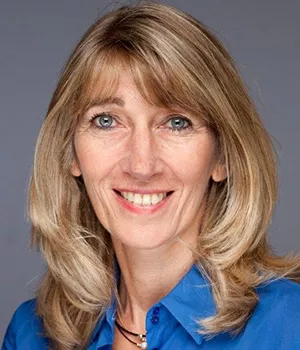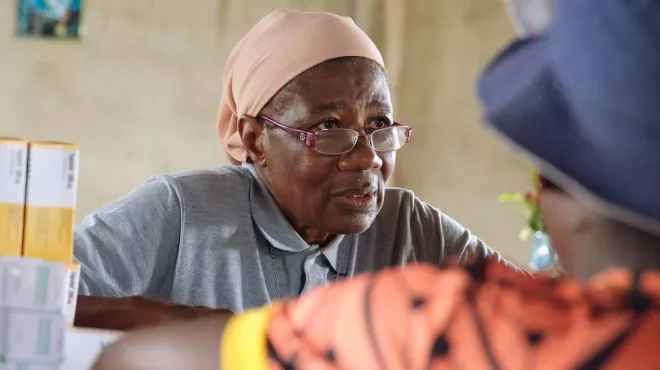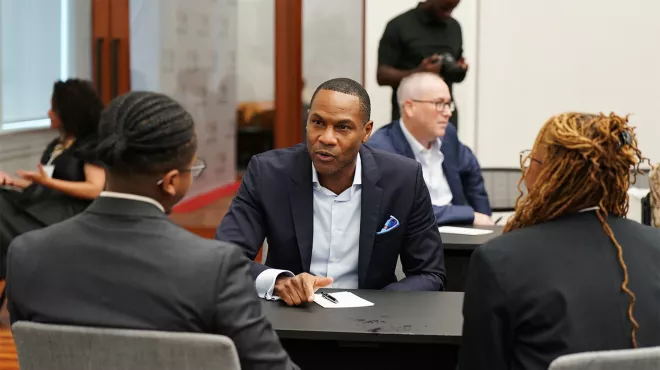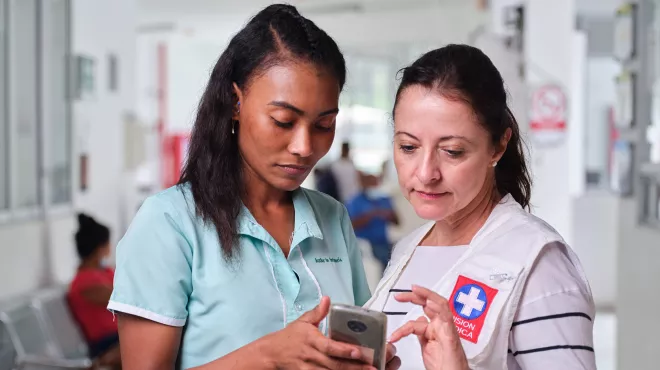Throughout Myriam Mendila’s life, cancer has been ever-present. When she was only 8 years old, breast cancer took her mother. Later, her sister was diagnosed with the disease, and Mendila watched dear friends weather cancer odysseys of their own.
Witnessing the enduring impact of the disease is what inspired Mendila – now Chief Medical Officer and Global Head of Medical Affairs at Novartis Oncology – to dedicate her professional life to helping find potential treatments for people with cancer. It’s also what made her well aware that, while so much of the world stopped for COVID-19, cancer wouldn’t – the emerging pandemic would only make cancer that much harder to treat.

Indeed, the pandemic, the pressure it has put on healthcare resources, and the distancing nature of the public health response have all created obstacles for medical research and the clinical care of patients. Some supply chains have been disrupted. Labs are operating at reduced capacity. Healthcare systems and workers have had to focus attention elsewhere. And for patients in clinical trials or in treatment, travel restrictions and the additional health risks posed by the virus have made it difficult to get needed care.
It’s a problem that has kept the Novartis Oncology Medical Affairs team busy. Mendila and her colleagues have had to adapt their efforts – which focus on providing medical education on cancer treatment, supporting clinical trials, and coordinating research efforts and access to experimental medicines still under investigation – to an altered reality. Following are excerpts from a conversation about how the team has kept support for patients, healthcare professionals and cancer clinical trials going despite the pandemic.
What challenges has the pandemic created for your team?
It was particularly challenging for clinical trials because many patients were reluctant to come back to the hospital for their regular visits. And if they didn’t come to the hospital, we couldn’t provide the experimental treatment – which meant the patients could be at risk of relapse – and we would have difficulties doing the safety monitoring that we would need to do to monitor for side effects.
It was also a challenge because we were in the middle of starting up a number of new clinical trials, and many sites can’t do trials right now because they understandably have to focus on the pandemic.
How did your team adapt to the situation?
First, we helped explore options for home delivery of our trial medications to make sure patients in our clinical trials had continued access to the experimental treatments and to help protect them from exposure to the virus. Novartis teams also figured out ways to help them go to their local physicians for monitoring to ensure our patients’ safety. Then we had to see how we could collect the data from these remote visits as well. Where we could, we used digital technologies to collect data and keep trials going.
We were all united working together. We needed to do something to fight the COVID-19 pandemic and so we found ways to share information, get back to each other and solve problems in record time.
Myriam Mendila
Outside of clinical trials, how has your team responded to the pandemic?
When the pandemic hit, our teams were bombarded with questions from patients, physicians and other healthcare professionals: “How does this affect the treatment of my cancer patient? Do I have to stop the Novartis medicine? What do I do in terms of monitoring?” So we very quickly developed a suite of medical resources that helped address those questions.
At the same time, Novartis as a company was also getting a lot of questions about COVID-19: “What are the emerging treatments and what is Novartis doing?” In response, our Medical Affairs team, along with others across Novartis, did an immense amount of work generating and communicating emerging scientific information related to COVID-19 itself.
And then most importantly, what we did company-wide was look at the portfolio of Novartis drugs – every single approved medication and those being developed and tested – and assess which of them might potentially help treat COVID-19.
Is there something your team has accomplished during this time that has made you particularly proud?
As more was learned and more scientific papers were published during the pandemic, there was growing evidence that one of our oncology medicines could potentially be repurposed to treat patients with severe COVID-19. While that evidence was evolving in the literature, we had to think how to get ready. We knew that, as clinical evidence emerged, there could be interest in this medicine and we needed to ensure that a) we had the ability to generate the necessary clinical data to prove whether there was a benefit to using the drug for COVID-19, and b) we had a plan for sharing all the information around the evolving scientific evidence. And the team was able to do all of that in record time to get us ready, and more importantly help patients. It was a fantastic accomplishment.
What do you think your team has learned through this experience?
One big lesson was how far you can go with collaboration. During this pandemic, first we saw internally and then across the industry an unprecedented level of collaboration. It was like the Berlin Wall falling down. We were all united working together. We needed to do something to fight the COVID-19 pandemic and so we found ways to share information, get back to each other and solve problems in record time. The collaboration was phenomenal and I really hope we can keep this spirit for the future.
Main image from Adobe Stock: 3d render of Sars-CoV-2, the virus that causes COVID-19.
Novartis remains committed to #cancer patients during #COVID19.



